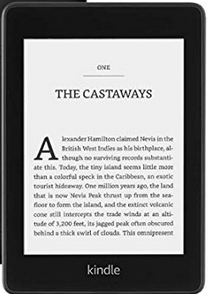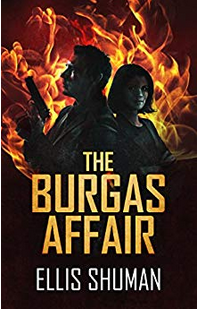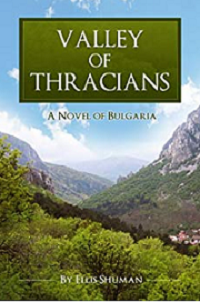 I'm delighted to welcome my friend Ellis Shuman to my blog today. Ellis is the author of the gripping suspense novel 'Valley of Thracians' as well as a collection of short stories entitled 'The Virtual Kibbutz'. He also writes a popular blog, where he posts book reviews, articles about Israel, Bulgaria, and anything else he fancies. You can find it here. https://ellisshuman.blogspot.com/ Reading one of Ellis's posts got me thinking. Which is the better medium for e-books, a dedicated e-reader or a tablet? Me, I love my basic Kindle. The battery life is amazing; I can go weeks between recharges, despite using the device most days. I also love e-ink; I can read my Kindle in bright sunshine, whereas the shiny screens on tablets render that difficult. Kindle Paperwhites also have a backlight facility, which enables readers to use their devices in the dark, and are also waterproof. Once my basic model stops working, I'll upgrade to a Paperwhite. I also like the fact that I can't access the Internet. Sure, my Kindle is wi-fi enabled, allowing me to browse Amazon for new books, but that's as far as it goes. For me, the fact I can't access Facebook, Twitter, Goodreads or any other of my favourite websites, is great. I can lose myself for hours in social media! Ellis prefers to read via a tablet  Ellis has a different take on the subject. 'I don't own a Kindle,' he says. 'I am a late adapter, if I adapt to a new technology at all. I have recently considered purchasing a Kindle, but feared that I would be falling behind the times with a single purpose device. In the end, I've elected to buy a tablet, giving me a handheld unit that will enable me to read digital books comfortably, as well as interact with the Internet when I see fit to do so.' I mentioned above how my Nook allows me to read in the dark. Ellis, of course, can do that as well with his tablet. The rest of this post is given over to him; he's written an article about why he enjoys reading digital books in bed at night. Seems his wife prefers the more traditional paperback, though! Over to you, Ellis. Reading in the dark - 'Lights out!'  When I was a young boy, this parental request meant an end to my nightly reading adventures, whether they be solving mysteries with the Hardy Boys or traveling 20,000 leagues under the sea with Jules Verne. In those days, I was obedient to a fault. The lights in my bedroom invariably went out at chapter's end. I never read books by flashlight because I could barely breathe under the covers. Four decades later and my reading preferences and habits have changed. Now, the words "Lights out" declared in my conjugal bedroom signal a start to the night's literary activities. My wife and I fire up our tablets, turn off the lights, and start reading in the dark. While my wife reads a family drama set against the Congo's fight for independence from Belgium, I read fiction as well as non-fiction, having selected recently published titles that will not only give me pleasure but which I will also review for my blog. Books delivered seamlessly and instantly  I was the first in our household to purchase a tablet, not for its Internet connectivity or for the ability to play games and watch videos on a handheld screen, but purely for the joy of reading digital books. While I appreciate the look and feel of flipping through the physical pages of a paperback, I also find pleasure in selecting a title to read, clicking a button, and having that book delivered seamlessly and instantly to my tablet. As a book reviewer, I frequently bookmark passages that I will consider quoting or paraphrasing in my reviews. This function is not available when I'm reading an advance reader copy (ARC) of a new book received in PDF format. Just the other day, my wife asked me how I keep track of passages to include in my reviews when reading a hard copy of a book. I realized that reviews of those books rely on my often faulty memory, rather than my leaving paper notes between the pages. Some of the books I've recently reviewed have been quite good and I gladly recommended them to my wife. This was a bit difficult when we were a one-tablet family and I was the only one reading in the dark. My wife purchased her own tablet and some of the ebooks I received made their virtual way into her hands as well. My wife hasn't totally warmed to reading digital copies of books. "What percentage are you up to?" I sometimes ask her, comparing how far each of us are in our respective reads at the end of the night. My wife doesn't see any benefit in a note informing her that she is three minutes away from the end of the chapter. She would much prefer to skim ahead through physical pages to determine when she plans to put down her book for the night. Time to go to sleep There are other things you just have to get used to when reading via tablet, whether it's the size of the font, the way you hold the device, and how to swish your finger to turn the pages. It's not the same experience as reading a paperback, that's for sure. But, there is one thing that my wife and I both experience at the end of the night, and it doesn't matter if we're reading a physical book, or a digital one on our tablet. When our eyes become tired, we end up reading the same sentence over and over, not comprehending the text or remembering what we've just read. It's time to shut down the tablet for the night, extinguishing the small light of its screen. At that point, the words "Lights out!" signal, just like they did in childhood, that it's time to stop reading and go to sleep. More about Ellis Shuman  Ellis Shuman was born in the United States but moved to Israel as a teenager. He served in the Israeli army, was a founding member of a kibbutz, and now lives outside Jerusalem. For two years, 2009-2010, Ellis and his wife lived in Sofia, Bulgaria. Ellis writes frequently about Bulgaria, Israel, books, travel, and other interesting things on his blog, which you can find at https://ellisshuman.blogspot.com/ And about his books, starting with The Burgas Affair She’s an Israeli data analyst. He’s a headstrong Bulgarian detective. Together they must track down those responsible for a horrific bombing. In the wake of a deadly terrorist attack at Burgas Airport in Bulgaria, Israeli and Bulgarian intelligence agencies launch a joint investigation. Detective Boyko Stanchev on the police task force teams up with Ayala Navon, a young Israeli intelligence analyst on her first overseas assignment. The two must establish whether the terrorists were assisted by a Bulgarian crime organization in laying the groundwork for the attack. It should be a routine investigation, but shadows of the past keep interfering. Boyko’s interactions with a crime boss pursuing a vendetta against him threaten to throw him off track. Ayala’s pursuit of the terrorists and their accomplices brings up painful memories of a family tragedy. Boyko and Ayala form a shaky alliance, one that evolves into growing cooperation and affection as they desperately race against time to uncover who was behind the Burgas bombing. The Burgas Affair is a fictional account of the aftermath of a very real terrorist attack. On July 18, 2012, a deadly explosive rocked a tourist bus at Burgas Airport, killing five Israelis and their Bulgarian bus driver. The terrorists responsible for this murderous attack have never been brought to justice. Valley of Thracians A Peace Corps volunteer has gone missing in Bulgaria and everyone assumes he is dead, everyone except his grandfather, who refuses to give up hope. Retired literature professor Simon Matthews launches a desperate search only to be lured into a bizarre quest to retrieve a stolen Thracian artefact—a unique object of immense value others will stop at nothing to recover. Matthews travels through a Balkan landscape dotted with ancient tombs and fortresses, unaware that his grandson has been confined to an isolated mountain cabin, slowly recovering from a severe head injury. Nothing can be taken at face value, as the woman assisting Matthews in his quest and the nurse caring for his injured grandson may have ulterior motives in helping the two reunite. Even when Matthews succeeds in joining up with his grandson, departure from Bulgaria is only possible if the missing relic can be found. The Virtual Kibbutz In this debut collection of stories, the author introduces you to kibbutz residents challenged with adapting to new realities. Along the way you'll see how kibbutzniks face up to the violence of the Intifada, cope with the Internet, and struggle to have more control over their lives.
3 Comments
Leave a Reply. |
Categories
All
Subscribe to my blog!
Via Goodreads
|
Join my Special Readers' group and receive a free copy of 'Blackwater Lake'!
|
Privacy policy Website terms and conditions of use
Copyright Maggie James 2018 - current date. All rights reserved.
Copyright Maggie James 2018 - current date. All rights reserved.
 RSS Feed
RSS Feed
